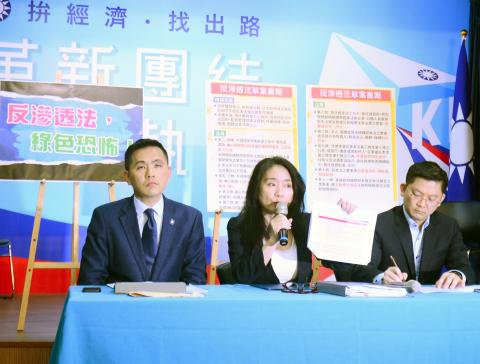The Chinese Nationalist Party (KMT) yesterday said that an anti-infiltration bill proposed by the Democratic Progressive Party (DPP) would undermine the nation’s freedom and democracy.
The DPP has been using alleged Chinese spy William Wang Liqiang’s (王立強) account of Chinese espionage activities to promote the bill, despite there being many questions about his story, KMT Chairman Wu Den-yi (吳敦義) said during the KMT’s Central Standing Committee meeting.
If passed, the anti-infiltration bill would “bring back Dong Chang (東廠),” a Ming Dynasty secret police agency, and undermine democracy and freedom, Wu said.

Photo: Wang Yi-sung, Taipei Times
Australian media on Saturday last week reported that Wang, a self-confessed former Chinese spy, has given Australia’s counterespionage agency inside intelligence on how Beijing conducts operations abroad.
Quoting Wang, reports said that he had helped funnel about 20 million yuan (US$2.85 million at the current exchange rate) of campaign donations to Kaohsiung Mayor Han Kuo-yu (韓國瑜) for his mayoral campaign last year.
Han is the KMT’s presidential candidate.
Wang also said that China had paid various Taiwanese news networks to broadcast news designed to negatively affect the DPP ahead of the Jan. 11 elections.
The KMT caucus would strongly support the bill if it could improve national security and social stability, but so far those issues had not been handled properly, KMT caucus whip William Tseng (曾銘宗) said.
Despite the bill’s far-reaching implications, the DPP aims to push it through a second reading tomorrow without going through a proper committee review, he said, adding that the Executive Yuan did not even offer an alternative version.
Earlier yesterday, the KMT held a news conference at its headquarters when it accused the DPP of trying to railroad the bill.
The bill contains many articles that are “vague” and could easily be used to set up the party’s political enemies, legislator-at-large candidate Charles Chen (陳以信) said.
For example, one article would ban people from making political donations under the instruction or using funds offered by a foreign state or organization that is an enemy of, or in a military standoff with, Taiwan, he said.
Based on that definition, Japan, the Philippines, Vietnam or even the US could be considered a source of infiltration if they become involved in a “military standoff” with Taiwan over disputed waters, he said.
The bill would give the government excessive power and would encroach on human rights, especially those of Taiwanese working and studying in China, he said.
The nation has already improved its mechanisms against infiltration after the Legislative Yuan in May passed amendments to national security laws, legislator-at-large candidate Stacey Lee (李貴敏) said at the news conference.
While the DPP said that an anti-infiltration act is needed to complement the newly amended national security laws, it is unclear why that would be necessary, she said.

Alain Robert, known as the "French Spider-Man," praised Alex Honnold as exceptionally well-prepared after the US climber completed a free solo ascent of Taipei 101 yesterday. Robert said Honnold's ascent of the 508m-tall skyscraper in just more than one-and-a-half hours without using safety ropes or equipment was a remarkable achievement. "This is my life," he said in an interview conducted in French, adding that he liked the feeling of being "on the edge of danger." The 63-year-old Frenchman climbed Taipei 101 using ropes in December 2004, taking about four hours to reach the top. On a one-to-10 scale of difficulty, Robert said Taipei 101

Nipah virus infection is to be officially listed as a category 5 notifiable infectious disease in Taiwan in March, while clinical treatment guidelines are being formulated, the Centers for Disease Control (CDC) said yesterday. With Nipah infections being reported in other countries and considering its relatively high fatality rate, the centers on Jan. 16 announced that it would be listed as a notifiable infectious disease to bolster the nation’s systematic early warning system and increase public awareness, the CDC said. Bangladesh reported four fatal cases last year in separate districts, with three linked to raw date palm sap consumption, CDC Epidemic Intelligence

Two Taiwanese prosecutors were questioned by Chinese security personnel at their hotel during a trip to China’s Henan Province this month, the Mainland Affairs Council (MAC) said yesterday. The officers had personal information on the prosecutors, including “when they were assigned to their posts, their work locations and job titles,” MAC Deputy Minister and spokesman Liang Wen-chieh (梁文傑) said. On top of asking about their agencies and positions, the officers also questioned the prosecutors about the Cross-Strait Joint Crime-Fighting and Judicial Mutual Assistance Agreement, a pact that serves as the framework for Taiwan-China cooperation on combating crime and providing judicial assistance, Liang

US climber Alex Honnold left Taiwan this morning a day after completing a free-solo ascent of Taipei 101, a feat that drew cheers from onlookers and gained widespread international attention. Honnold yesterday scaled the 101-story skyscraper without a rope or safety harness. The climb — the highest urban free-solo ascent ever attempted — took just more than 90 minutes and was streamed live on Netflix. It was covered by major international news outlets including CNN, the New York Times, the Guardian and the Wall Street Journal. As Honnold prepared to leave Taiwan today, he attracted a crowd when he and his wife, Sanni,